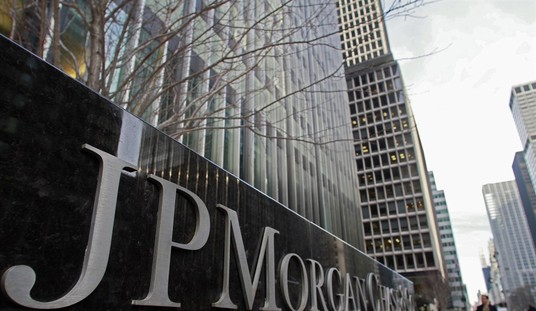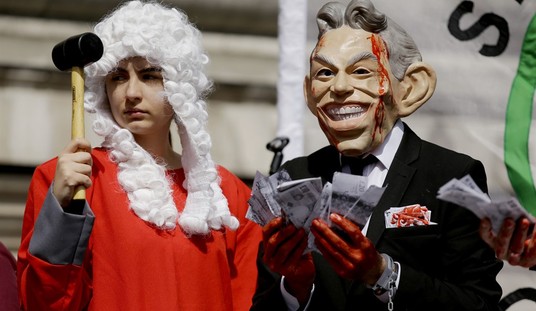Is another shoe about to drop on the Clinton Foundation, and on Hillary Clinton’s problematic rollout? Newsweek’s Rory Ross reported this morning that the largest individual donor to the Clinton family business has conducted trade with Iran, perhaps in breach of US sanctions. Ukrainian energy mogul Victor Pinchuk has connections to the Clintons that go back almost a decade, and financial connections to the regime in Tehran that go much farther:
The fourth richest man in Ukraine, Pinchuk owns Interpipe Group, a Cyprus-incorporated manufacturer of seamless pipes used in oil and gas sectors.
Newsweek has seen declarations and documents from Ukraine that show a series of shipments from Interpipe to Iran in 2011 and 2012, including railway parts and products commonly used in the oil and gas sectors.
Among a number of high-value invoices for products related to rail or oil and gas, one shipment for $1.8m (1.7m) in May 2012 was for “seamless hot-worked steel pipes for pipelines” and destined for a city near the Caspian Sea.
Both the rail and oil and gas sectors are sanctioned by the US, which specifically prohibits any single invoice to the Iranian petrochemical industry worth more than $1m.
In other words, Interpipe should have been slapped with penalties and sanctions for its operations with Iran. Pinchuk’s company has a US subsidiary, which means that US sanctions apply across the entire organization. The agency for imposing penalties for sanctions violations in these cases, Ross notes, is the State Department. Who was in charge at the State Department during this period? None other than Hillary Clinton.
Pinchuk was among an elite few dumping tons of money into the Clinton Foundation, some of whom have interesting connections for a former Secretary of State:
Then there are checks worth millions of dollars from company executives, philanthropists, billionaires and foreign organizations, among them the Ukranian Victor Pinchuk, the Saudi Mohammed al-Amoudi and Rilin Enterprises, which is led by Chinese billionaire Wang Wenliang, a member of the Chinese parliament.
The contributions are legal, but funds from individuals or entities that have considerable diplomatic or economic clout to defend in Washington, expose Clinton to suspicions of conflict of interest since the Democrat gains directly from the success of the foundation which has carried her name since 2013.
Even as far back as 2008, prior to Hillary Clinton becoming SecState, Pinchuk was one of the larger donors to the foundation — between $1 million and $5 million, according to the disclosure. While serving in that role for four years, Pinchuk coughed up at least $8.6 million, but that was just a down payment for what was planned to be a much bigger donation for the Clinton Global Initiative, supposedly a separate operation during her tenure at State:
Between 2009 and 2013, including when Mrs. Clinton was secretary of state, the Clinton Foundation received at least $8.6 million from the Victor Pinchuk Foundation, according to that foundation, which is based in Kiev, Ukraine. It was created by Mr. Pinchuk, whose fortune stems from a pipe-making company. He served two terms as an elected member of the Ukrainian Parliament and is a proponent of closer ties between Ukraine and the European Union.
Mr. Pinchuk and his wife—the daughter of former Ukraine PresidentLeonid Kuchma—began donating to Clinton charities in 2006 after being introduced to Mr. Clinton by Doug Schoen, a pollster who has worked for both Clintons.
In 2008, Mr. Pinchuk made a five-year, $29 million commitment to the Clinton Global Initiative, a wing of the foundation that coordinates charitable projects and funding for them but doesn’t handle the money. The pledge was to fund a program to train future Ukrainian leaders and professionals “to modernize Ukraine,” according to the Clinton Foundation. Several alumni are current members of the Ukrainian Parliament. Actual donations so far amount to only $1.8 million, a Pinchuk foundation spokesman said, citing the impact of the 2008 financial crisis.
Despite all of Pinchuk’s activity with Iran, the State Department apparently took no action against his company or Pinchuk himself. That lack of response finally got the attention of Rep. Steve Stockman last November, before his retirement, who requested that the Department of the Treasury investigate Interpipe. So far, there have been no developments on that front.
The timing of this release is curious. This is a bona-fide scoop, and yet Newsweek published it on a Saturday morning — perhaps the lowest-attention spots in the news cycle. Ross frames this oddly, too, in the lead:
Enemies of Hillary Clinton waiting to discredit her bid for the White House are likely to seize on news that one of the biggest benefactors to the Clinton Foundation has been trading with Iran and may be in breach of US sanctions imposed on the country.
Where to start with this paragraph? First of all, “enemies” should be opponents, unless one is so invested in Hillary 2.0 as to mistake the latter for the former. Mostly, though, is the big story here that Hillary’s opponents are “likely to seize” on evidence of corruption — or the evidence of corruption itself? Would Newsweek have covered Watergate with the lead, “Enemies of Richard Nixon are likely to seize on the Oval Office tapes in an attempt to discredit him”? I rather think not.
Update: Vox’s new political editor, Jonathan Allen, has a better take on why the Clinton Foundation holds so much risk for Hillary, and for Democrats in general:
Critics of the Clinton Foundation portray it as an ingenious backroom pay-to-pay scheme obscured by the mom-and-apple-pie work going on at the front desk. One concern is that US individuals and corporations gain access to the Clintons, curry favor with them, and use their affiliation with the former first couple to launder their brands. They’ve collected money from folks who turned out to be pretty unsavory, including Jeffrey Epstein. In return, the Clintons get money for projects that help the underprivileged, burnish their own brands, and continue to build their political network.
The other major point of contention is the foundation’s longtime practice of accepting contributions from foreign countries. Bill and Hillary Clinton agreed to suspend most of those donations while Hillary was secretary of state, but at least one — a $500,000 check from Algeria for Haitian earthquake relief — slipped through the cracks. And the Clintons resumed taking money from foreign governments after Hillary resigned from the Obama administration in early 2013. Saudi Arabia and Norway have each given between $10 million and $25 million to the Clinton Foundation since its inception, according to the organization’s records. …
- It reinforces a series of powerful memes against Hillary Clinton: Republicans say she’s unwilling to play by the same rules as everyone else, and her populist turn on the campaign trail is at odds with her big-dollar fundraising, much of it from foreign governments and individuals.
- Perhaps more important — since most Republicans aren’t inclined to vote for her — it reminds Democrats of two toxic perceptions about Clinton within the Democratic Party: she’s too cozy with, perhaps even co-opted by, the very Wall Street and corporate titans who are most reviled on the left (Barclays, Citi, Goldman Sachs, ExxonMobil, and Walmart are all foundation supporters), and she exercises poor judgment around both the money she raises and the company she keeps.
It’s a little more than just a poor choice of friends. The person in charge of enforcing sanctions on Iran somehow missed key violations from a man who was pouring millions of dollars into her family foundation. That smells to high heaven.
Update: Added a point from Newsweek in the initial excerpt and updated the paragraph that follows to note that Interpipe was violating sanctions. It may not have been clear in the original post.
Update: Mark Hemingway also notes the peculiar lead, and says campaign coverage is only going to get worse:
The worst reading of this is that the media is hopelessly biased in favor of Democrats, and to some latent degree actually buys into Hillary Clinton’s famous assertion that there’s a “vast right-wing conspiracy” out to get her. The most favorable interpretation of this is that the media is incapable of covering substantive facts in a straightforward manner, and always defaults to petty horse race coverage of the presidential race. And there’s always a possibility that it’s a little bit of both.
But any way you read this, it’s a reminder of how bad campaign coverage has been in recent elections. It’s going to be a long 18 months.
Get ready for the but will Republicans overreach meme every time something damaging emerges about Hillary. It’s how the media rolls these days.








Join the conversation as a VIP Member